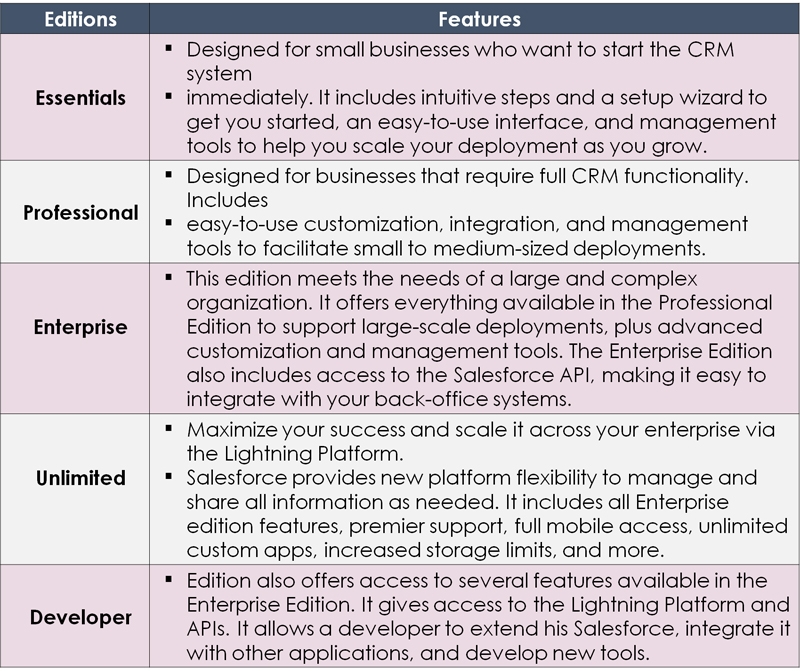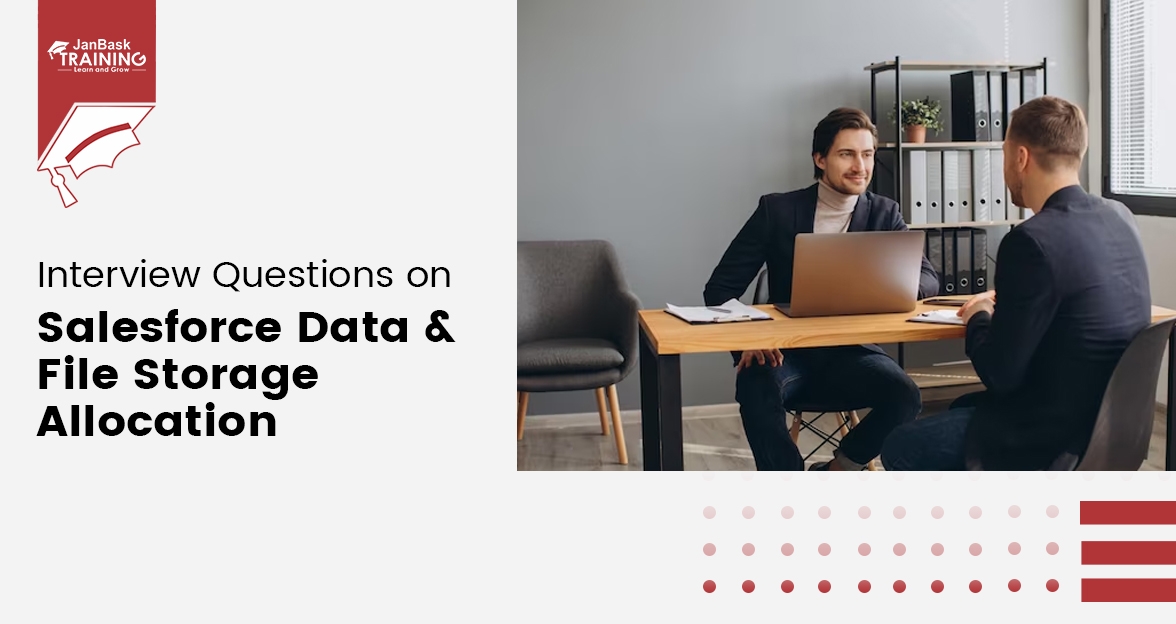 Grab Deal : Flat 30% off on live classes + 2 free self-paced courses - SCHEDULE CALL
Grab Deal : Flat 30% off on live classes + 2 free self-paced courses - SCHEDULE CALL

 Grab Deal : Flat 30% off on live classes + 2 free self-paced courses - SCHEDULE CALL
Grab Deal : Flat 30% off on live classes + 2 free self-paced courses - SCHEDULE CALL

Ans: Salesforce offers bundles of features and services tailored to your specific business needs called the edition; these bundles look the same but differ in features and prices. Some Salesforce customers start with a basic version and upgrade to more feature-rich versions as their business needs to evolve.
Here is a brief description of each edition Salesforce offers.

Ans: Some major Salesforce editions include:-
Sales Cloud: Focuses on sales automation, lead management, and opportunity tracking.
Service Cloud: Offers tools for case management, knowledge base, and customer support.
Marketing Cloud: Specializes in marketing automation and digital marketing campaigns.
Commerce Cloud: A platform for creating and managing e-commerce solutions.
Community Cloud: Helps build online communities for customers, partners, or employees.
Einstein Analytics (Now Part of Tableau): Provides advanced analytics and reporting capabilities.
Learn more about Salesforce editions by enrolling in Salesforce Training with JanbaskTraining.
Ans: Sales Cloud is focused on sales automation, lead management, and opportunity tracking. It helps sales teams manage their leads, contacts, accounts, and opportunities. On the other hand, Service Cloud is designed for customer service and support. It provides tools for case management, knowledge base creation, live chat, and more. While Sales Cloud is geared towards the sales process, Service Cloud is aimed at providing exceptional customer support.
Ans: Commerce Cloud, formerly known as Demandware, is Salesforce's solution for e-commerce. It enables businesses to create and manage online shopping experiences, including features like product merchandising, customer engagement, and order management. Commerce Cloud is designed to help businesses establish and enhance their online retail presence.
Ans: The Controlled Setting Edition and Controlled Setting products are versions of the Salesforce app that give customers greater control over the data flow within their organization. The Controlled Setting Edition restricts the use of features that require connections outside your Salesforce organization. Some parts are not available due to this isolation constraint. In addition, controlled settings products restrict the use of features that require external connectivity or require to be disabled by default.
Ans: Storage allocation by Salesforce edition refers to the default number of licensed users in your organization. One can break down storage into two categories. File storage includes attachments, files home, Salesforce CRM Content, Chatter files (including user photos), document tabs, custom fields for knowledge articles, and files for Site.com assets.
Data storage includes
[Article Type Name]")[Article Type Name] Version”)Ans: Contact Manager, Group, Enterprise, Performance, Unlimited, Developer, and Personal editions are allotted storage space for 1 million extensive object records per organization. Contact Salesforce helps to increase the limit. Storage for large objects is calculated asynchronously, so new forms are not reflected immediately. The Large Object Record limit is not actively monitored, but Salesforce reserves the right to enforce the limit if necessary. Quotas are enforced in most cases, and records cannot be added when the quota is exceeded. Salesforce's external and big object record allocation is contractually executed for active and productive organizations.
Ans: Salesforce releases new products and features every three times a year, identified by seasons (winter, spring, summer) and calendar year. Example: Winter '15.The Salesforce Release Notes for each release include new functionalities and products that are generally available or in beta. It also describes changes to existing features and products.
Find the release notes by searching for "release notes" in Salesforce Help.
Ans: Customers using Salesforce Lightning Experience are more productive than those working in Salesforce Classic. To ensure our customers enjoy these productivity gains, selected trials and purchased multi-edition subscriptions offer Lightning Experience as a dedicated user interface for non-administrator end users. Admins in these organizations can access Salesforce Classic but cannot turn off Lightning Experience or give users access to Salesforce Classic on the Lightning Experience Migration Assistant setup page.
Ans: The Controlled Setting Edition and Controlled Setting products are versions of the Salesforce app that give customers greater control over the data flow within their organization. The Controlled Setting Edition restricts the use of features that require connections outside your Salesforce organization. In addition, controlled settings products limit the use of features that require external connectivity or to be disabled by default. Some parts are not available due to this isolation constraint.
Salesforce editions play a crucial role in tailoring the Salesforce CRM platform to meet the diverse needs of businesses. Understanding the differences between these editions is essential for anyone seeking a role in Salesforce administration, implementation, or consulting.
If you still require expert advice, search online for “Salesforce training near me,” or contact our online Salesforce training experts at JanBask Training right now!

Must-Know Salesforce Apex Interview Questions and Answers

Top JWS and JWT Interview Questions and Answers

Interview Questions Based On Login Issues & Passwords

Interview Questions on Salesforce Data & File Storage Allocation

Cyber Security

QA

Salesforce

Business Analyst

MS SQL Server

Data Science

DevOps

Hadoop

Python

Artificial Intelligence

Machine Learning

Tableau
Download Syllabus
Get Complete Course Syllabus
Enroll For Demo Class
It will take less than a minute
Tutorials
Interviews
You must be logged in to post a comment